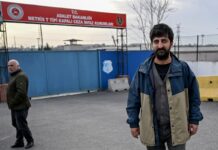Turkish journalist Yüsra Batıhan, who reported on alleged failures in the government’s response to the February 2023 earthquakes, is facing charges under the country’s controversial “disinformation law,” the Media and Law Studies Association (MLSA) reported on Thursday.
Batıhan, a reporter for the pro-Kurdish Mezopotamya Agency, is being prosecuted for social media posts she shared on X about conditions in Hatay province, one of the regions hit hardest by the earthquakes. The Ankara Chief Public Prosecutor’s Office claims her posts spread false information that could incite public fear and unrest.
The charges stem from Batıhan’s social media posts sharing articles she wrote about conditions in the aftermath of the earthquakes in Hatay and allegations of government suppression of relief efforts. Among them is the claim that the Disaster and Emergency Management Authority (AFAD) blocked the press from reporting on the disaster relief efforts. Another alleges that aid sent by NGOs for earthquake victims was confiscated by authorities.
The magnitude 7.8 and 7.5 earthquakes of February 6, 2023 affected 11 provinces in the country’s south and southeast, killing close to 60,000 people in Turkey and parts of Syria and leaving millions homeless.
Authorities initiated an investigation after Adana police flagged Batıhan’s social media posts during an internet-monitoring operation, despite a 2020 Constitutional Court ruling that deemed such surveillance unconstitutional. The indictment alleges that Batıhan’s posts could disrupt public order and cited her as engaging in “repeated offenses” by sharing “false” information multiple times.
Batıhan denies the accusations. Speaking to a Mersin court on Thursday, she emphasized her role as a journalist and defended her right to share verified information.
“I reported accurate and confirmed details and exercised my constitutional right to freedom of expression,” she said. “It is absurd to talk about public peace when people are still trapped under rubble days after the earthquake.”
The indictment dismissed Batıhan’s defense as an attempt to evade responsibility. It also rejected her assertion that she was merely performing her journalistic duty, stating that this defense was “not credible.”
A second hearing is scheduled for January 21, 2025, at the Ankara 75th Criminal Court of First Instance. If convicted, Batıhan could face up to three years in prison.
Batıhan has criticized the government’s broader efforts to control the narrative surrounding the earthquake response. “Mainstream journalists were ordered not to talk to earthquake survivors. Independent journalists like me, who couldn’t be silenced, are being targeted with disinformation investigations,” she said.
Turkey’s disinformation law, enacted in 2022, has drawn widespread criticism from press freedom advocates, who argue it is being used to stifle dissent and muzzle independent media. It builds upon earlier amendments to law that many say deepen online censorship and restrict access to information.
The legislation criminalizes the dissemination of “false or misleading information,” carrying prison sentences of up to three years. Critics argue that these measures are being used to stifle dissent and silence opposition voices.
The government has also ramped up monitoring of online activity, with thousands of social media users investigated annually for posts deemed critical of authorities or state institutions.
Batıhan says the case highlights how authorities are using the disinformation law to silence independent journalism.
The investigation was triggered by a tip from the cybercrime unit of the southern province of Adana, which flagged Batıhan’s posts during routine “virtual patrols.” However, the legal basis for these patrols was annulled by Turkey’s Constitutional Court in 2020 as a violation of privacy rights. Despite this, the practice continues.
The prosecution dismissed Batıhan’s defense that her posts were factual and within her right as a journalist, labeling her argument as an attempt to “escape liability.” The indictment argues that her posts spread “false information” harmful to public order and invokes Turkey’s disinformation law to seek enhanced penalties under provisions for repeated offenses.
Batıhan rejected the accusations during her initial court appearance, stating, “I obtained accurate, verified information and shared it with the public. There was no public peace in an environment where earthquake victims were still under rubble. The real disruption to public peace was the neglect of relief efforts.”
The case has drawn criticism from press freedom advocates, who see it as part of a broader crackdown on journalists. In remarks to the Media and Law Studies Association, Batıhan said, “The government is targeting journalists it cannot control with disinformation investigations to suppress dissent. I am neither the first journalist prosecuted for reporting during the earthquake nor will I be the last.”
The second hearing in the case is scheduled for Jan. 21, 2025, at the Ankara 75th Criminal Court of First Instance.















